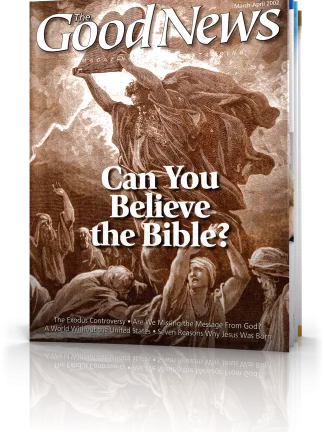The Bible vs. Modern Scholarship
A Good News Interview with Bryant Wood, Ph.D.
The Good News: Dr. Wood, there is considerable debate about the timing of the Exodus, the destruction of Jericho and the conquest of the Promised Land. When do you date the Exodus, and why?
Bryant Wood: I would date the Exodus to the mid-15th century [B.C.] based on the internal chronological data in the Bible—primarily 1 Kings 6:1, which says that the Israelites left Egypt 480 years before Solomon began to build the temple. Solomon began to build the temple around 970 B.C. plus or minus a few years. If you go back 480 years, it takes you to about 1450, to the date of the Exodus.
There are supporting scriptures. One is Judges 11:26, which refers to the fact that the Israelites had been in the land for 300 years at the time of Jephthah, and Jephthah would date around 1100, although we can't be precise about it. So you go back 300 years and it would put you around 1400 for the time of the conquest.
We have some chronological or genealogical data in 1 Chronicles 6, where genealogies are listed, and one that seems to be complete—Heman the singer, where his genealogy is traced from the time of Moses down to the time of David. There are 18 generations. Then if you add one to Solomon that would make it 19. Assuming a generation is approximately 25 years, you come up with 475, which pretty well matches the 480 figure.
The point is that all the chronological indications in the Old Testament support this earlier dating of the mid-15th century for the time of the Exodus and the late 15th century for the time of the conquest.
Scholars have come up with an alternative date which is sometimes referred to as the "late date" of the Exodus, around 1270, with a conquest of 1230, but that is simply a scholarly construct; there is no biblical basis for it. They base their view on Exodus 1:11, which says that the Israelites built the store cities of Pithom and Rameses. Rameses is the name that was given to a place in the 13th century, but that city existed earlier under a different name.
So I believe it was simply an updating of a name to something that was more familiar. But these scholars say they think it is the name of the place at the time the Israelites were building it—and so, based on that, they would say that the Exodus should be dated to the 13th century.
GN: Why is the correct dating of the destruction of Jericho important?
BW: Dating is very important in archaeology because you have to correlate your archaeological findings with the Bible. And the only way you can do that is by, No. 1, knowing the dates of things in the Bible and, No. 2, knowing the dates for the archaeological findings so that you can match them up. Many of the so-called disagreements between archaeology and the Bible are because of improper dating of things—either biblical events or the archaeological finds. So dating is absolutely critical to correlate archaeology and the Bible.
GN: British archaeologist Kathleen Kenyon excavated in Jericho in the 1950s and concluded that the biblical account was wrong. Why is her 150-year miscalculation so critical to understanding the events of the Bible or proving them?
BW: Well, that was her error in her dating of the destruction of Jericho. She dated it to 1550 B.C. when in fact she should have dated it to 1400 B.C. When you make an error like that then you don't properly correlate with the events of the Bible. By dating the destruction 150 years before Joshua, she said that there was no evidence to support the biblical event.
Again, it's crucial to get your dating correct if you're trying to make a correlation.
In fact, because of that error she said that the Bible was wrong, and this became the No. 1 example of archaeology's showing that the Bible was wrong and that there was no conquest. In fact, when you do the proper interpretation of the evidence and get the correct dating, the opposite is the case.
Jericho provides detailed evidence that supports the accuracy of the Bible. In fact, the evidence found at Jericho shows that the Bible was an eyewitness account and couldn't possibly have been written at a later time to explain some ruins there.
GN: Can you tell us briefly about Ai, the second city the Bible records as being destroyed in the conquest?
BW: Ai is the second big problem with regard to the conquest in biblical archaeology and biblical history because the site that scholars have identified as Joshua's Ai was not occupied during the time of Joshua. It was occupied much earlier in the Early Bronze period, when it was a very large urban center.
It was destroyed about 2400-2300 B.C. and then lay abandoned in the Middle Bronze period and the Late Bronze period.
It was reinhabited in the Iron Age I period around 1100 B.C. So there was a huge gap in occupation, and, no matter when you want to date the Exodus and conquest, it has to fall somewhere between those dates. So, quite clearly, it can't be Joshua's Ai if you put any stock in the biblical account.
But secular scholars will say, "Well, we believe that's Ai and we believe the biblical story was made up to explain these ruins and that the event never happened." My organization, the Associates for Biblical Research, has been doing fieldwork in Israel since 1979 searching for the real Ai, as it were, and in 1995 we began working at a site that is one kilometer west of et-Tell, the site scholars claim is Joshua's Ai. The name of the site is Khirbet el-Maqatir. At that site we have found a fortress that dates to the time of Joshua. We have evidence that it was burned by fire about 1400 B.C., which is, of course, what the Bible tells us in Joshua 8.
The topography of the area matches exactly what we read in the Bible. We have details given about an ambush force being hidden on the west, a hill to the north, and various details that are given in Joshua 7 and 8 that match perfectly with our site and the area around it. We feel quite strongly that we have found the site of Joshua's Ai.
The et-Tell site probably is the site of Abraham's Ai mentioned in Genesis 12:8, when it says Abraham pitched his tent on a hill with Bethel to the west and Ai to the east. So probably that was Ai of Abraham's day. The name Ai means "the ruin" in Hebrew, and the Arabic name et-Tell also means "the ruin." So that would seem to be the origin of the name, this big Early Bronze Age ruin that's there. And then, when this little fortress was built one kilometer to the west, that same name was applied.
This is not unique, because there are other ruins in the area of et-Tell that have retained that same name, Ai, in the modern Arabic name. There are maybe half a dozen sites in the vicinity of et-Tell that have maintained that name that were occupied in various periods. So this is another major breakthrough, to come up with the evidence to support Joshua 7 and 8, because Jericho and Ai were the two problems that scholars always pointed to and said: "Oh, look, we've got the archaeology here that disproves the Bible. Therefore there was no conquest." But we think we've solved those problems now. We have the evidence to show that, yes, there was a conquest.
GN: How vast is the gulf between the maximalists—the scholars who think the Bible is true—and the minimalists, who reject it as a historical account?
BW: It's pretty big. It depends on the scholar and what time period you're talking about. I would be considered an ultramaximalist because I would take the Bible literally from Genesis onward as far as the historical reliability is concerned. Others, like Bill Dever, for example, who is a purely secular scholar, would consider himself a maximalist because he believes the Iron Age or kingdom period of Israel is historically accurate. But he would not believe that anything prior to that is historically accurate. Yet he considers himself a maximalist because there are those who would say that even in the Iron Age period the biblical account is not reliable and accurate. So those would be the minimalists.
So there are different shades of views.
GN: So the maximalist for one period could be a minimalist for another?
BW: That's right. So the gap between myself, an ultramaximalist, and a minimalist is huge because they would discount anything before about 900 B.C. They would say anything prior to the divided kingdom is myth and legend. There never was a David, Solomon or Saul. Those people never existed; there was never an Israelite kingdom in that period.
They would discount all of that and, of course, everything before it.
GN: How could that gap be bridged?
BW: It will probably never be bridged.
I think there are people who are so biased that they will never accept the historicity of the Bible. It's much like the creation- vs.-evolution debate. It doesn't matter how much evidence you bring to disprove evolution, scholars will cling to it because they've rejected the idea of a divine Creator. They simply will not accept that as an option, so they're going to cling to evolution no matter what.
We have a similar situation with regard to Old Testament history. There are people who are so biased against the Bible that they will never accept it as literal history.
I think that's a spiritual battle that's going on, a spiritual problem. That's what's at issue. They've rejected God, they don't want to have anything to do with God or the message of the Bible, and so they're always going to discount it and find reasons not to believe. Even though the evidence may be very powerful and straightforward, they'll explain it away or reject it.
GN: What kind of walls do you see hindering the publishing of some of the findings that would prove the Bible's history to be true?
BW: That's very difficult because there's a strong anti-Bible bias in the academic journals that publish archaeological findings. There again, it depends on what it is you're publishing. If you're publishing something on the Iron Age, the time of the kings of Israel and Judah, they [the journals] are comfortable with it. But, when you get into the earlier periods, they're very uncomfortable.
So it's very difficult to publish anything in an academic journal dealing with the historicity of the period of Judges or Joshua or the Exodus or any of those earlier periods because in academia it's an established fact that this whole time period is legendary. Because it's very difficult to get anything published, you have to go through other avenues and outlets. There are some other possibilities. Israeli journals and Biblical Archaeology Review will publish conservative materials, but that's kind of a popular journal rather than an academic journal. It's a big challenge to get conservative material published for the earlier biblical periods. GN



